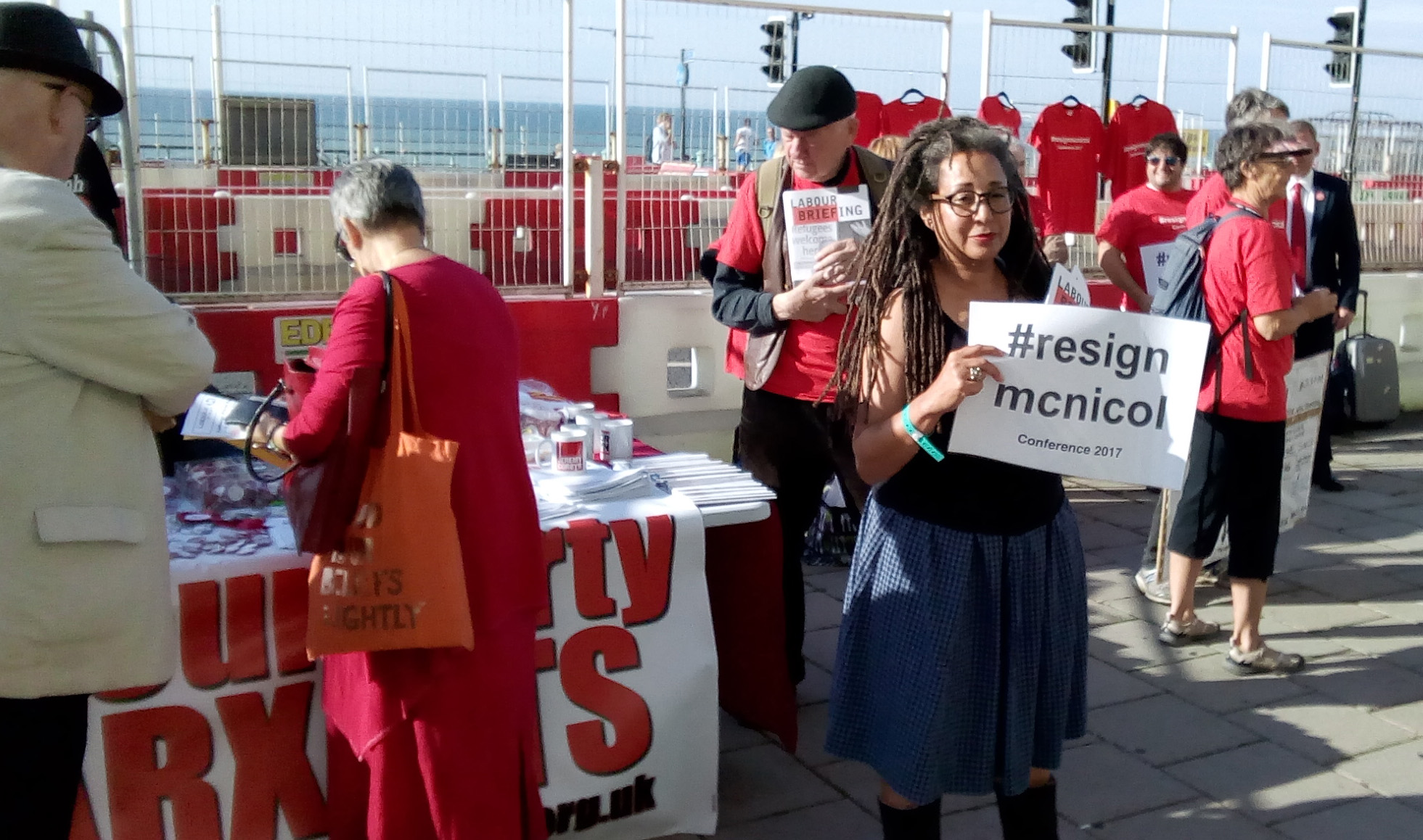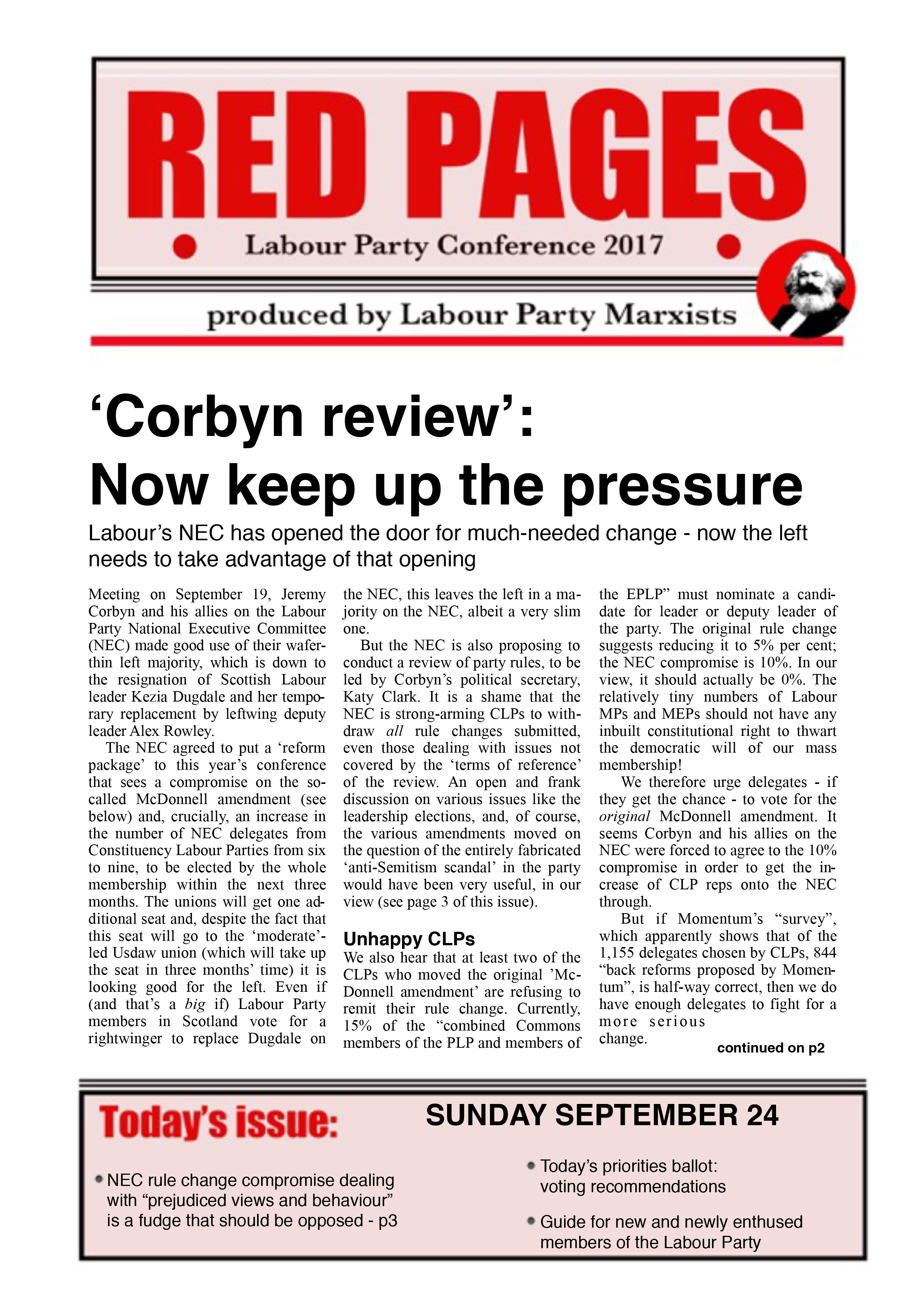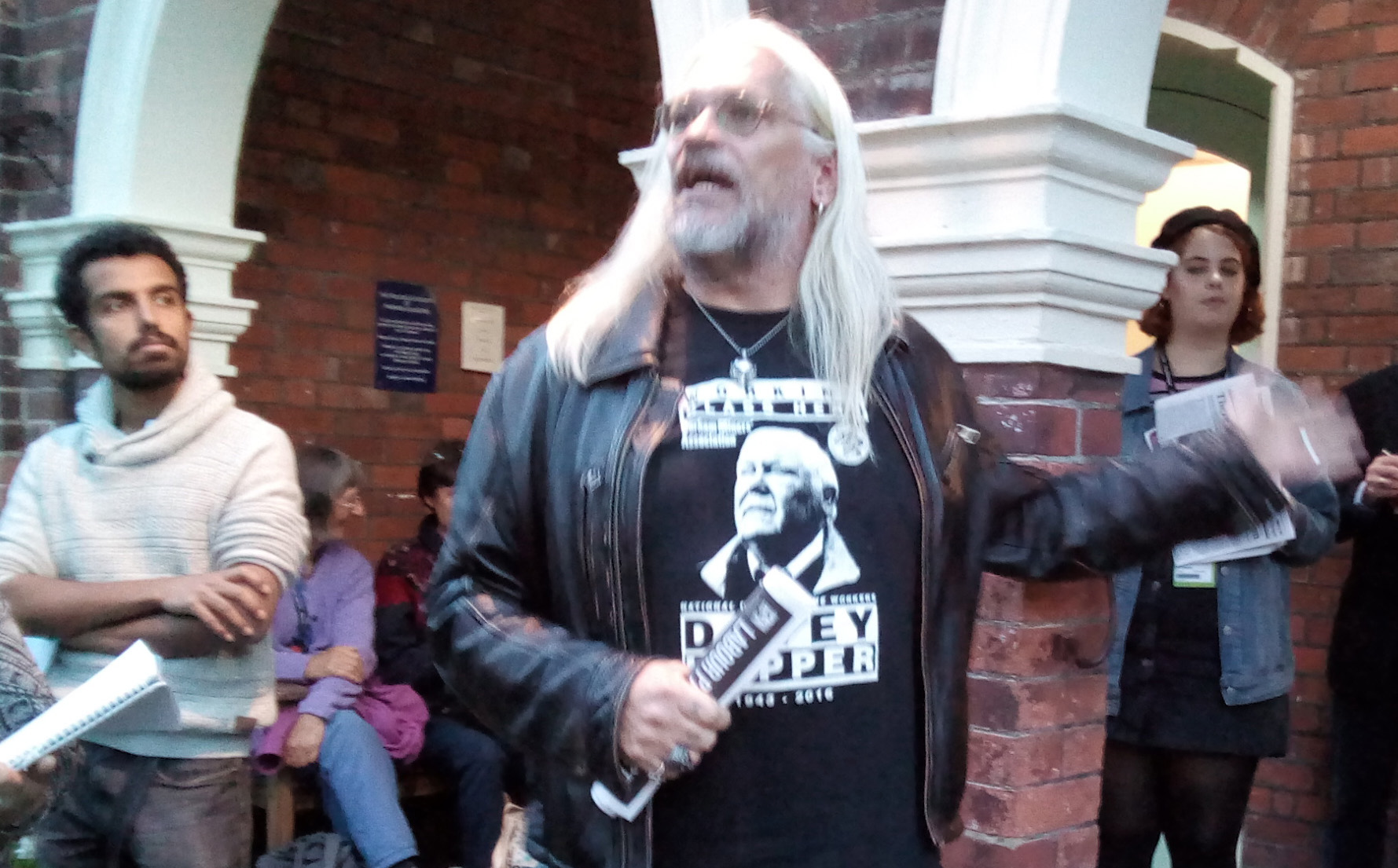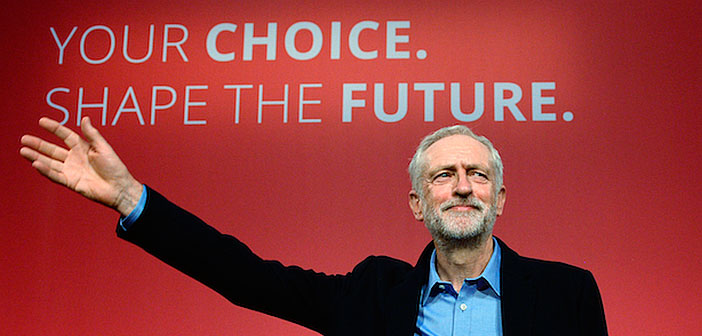Click here to download the September 24 issue of Red Pages in PDF format.
Articles in this issue:
- Voting recommendation: today’s priorities ballot
- ‘Corbyn review’: Now keep up the pressure
- Vote against the NEC ‘compromise’ on anti-Semitism
Voting recommendation: today’s priorities ballot
Yesterday’s meeting of the Campaign for Labour Party Democracy was so packed that a few dozen delegates were briefed on the lawn outside Friends’ House. Barry Gray urged CLP delegates to vote for the following four thematic issues, so that they can be debated by conference throughout the week: Social care; NHS; Housing; Railyways.
The unions have already decided on the following four subjects, which means delegates should not vote for them, as they will be discussed anyway:
Growth & Investment; Public sector pay; workers rights; Grenfell.
Comrade Gray explained that a staggering 185 ‘contemporary motions’ had been submitted by CLPs. As usual, about a third had been ruled ‘out of order’ – mainly because the motion was dealing with issues already “substantially covered” by the documents produced by the National Policy Forum (to which Tony Blair outsourced policy-making in the party). However, the NPF documents are incredibly vacuous and bland and, as comrade Gray said, the application of this rule tends to be “very flexible” – ie, the conference arrangements committee rules out whatever it likes. This means we will not be hearing motions on, for example, Saudi-Arabia, grammar schools, fracking and nuclear weapons.
While left-wingers Seema Chandwani and Billy Hayes have been elected onto next year’s CAC, this year’s proceedings are unfortunately still dominated by a right-wing CAC. Incidentally, it was also this body that went well beyond its remit and offered Sadiq Khan a speaking slot at conference, despite the NEC having previously decided against it.
We believe that conference should be the sovereign body of the party: The NPF should be abolished, as should the practice of “merging” all contemporary motions that fall into the same theme. The end result tends to be final motions that are so bland and uncontroversial that they really clarify nothing.
‘Corbyn review’: Now keep up the pressure
Labour’s NEC has opened the door for much-needed change – now the left needs to take advantage of that opening
Meeting on September 19, Jeremy Corbyn and his allies on the Labour Party National Executive Committee (NEC) made good use of their wafer-thin left majority, which is down to the resignation of Scottish Labour leader Kezia Dugdale and her temporary replacement by leftwing deputy leader Alex Rowley.
The NEC agreed to put a ‘reform package’ to this year’s conference that sees a compromise on the so-called McDonnell amendment (see below) and, crucially, an increase in the number of NEC delegates from Constituency Labour Parties from six to nine, to be elected by the whole membership within the next three months. The unions will get one additional seat and, despite the fact that this seat will go to the ‘moderate’-led Usdaw union (which will take up the seat in three months’ time) it is looking good for the left. Even if (and that’s a big if) Labour Party members in Scotland vote for a rightwinger to replace Dugdale on the NEC, this leaves the left in a majority on the NEC, albeit a very slim one.
But the NEC is also proposing to conduct a review of party rules, to be led by Corbyn’s political secretary, Katy Clark. It is a shame that the NEC is strong-arming CLPs to withdraw all rule changes submitted, even those dealing with issues not covered by the ‘terms of reference’ of the review. An open and frank discussion on various issues like the leadership elections, and, of course, the various amendments moved on the question of the entirely fabricated ‘anti-Semitism scandal’ in the party would have been very useful, in our view (see page 3 of this issue).
Unhappy CLPs
We also hear that at least two of the CLPs who moved the original ’McDonnell amendment’ are refusing to remit their rule change. Currently, 15% of the “combined Commons members of the PLP and members of the EPLP” must nominate a candidate for leader or deputy leader of the party. The original rule change suggests reducing it to 5% per cent; the NEC compromise is 10%. In our view, it should actually be 0%. The relatively tiny numbers of Labour MPs and MEPs should not have any inbuilt constitutional right to thwart the democratic will of our mass membership!
We therefore urge delegates – if they get the chance – to vote for the original McDonnell amendment. It seems Corbyn and his allies on the NEC were forced to agree to the 10% compromise in order to get the increase of CLP reps onto the NEC through.
But if Momentum’s “survey”, which apparently shows that of the 1,155 delegates chosen by CLPs, 844 “back reforms proposed by Momentum”, is half-way correct, then we do have enough delegates to fight for a more serious change.
Temporary compromise
The “terms of reference” of the “Party Democracy Review”, which “will aim to produce a first report within 12 months”, includes a review of the method on how to elect the party leader (“including the role of registered supporters and the issue of nominating thresholds”) and the “composition of the NEC”. In other words, much of the compromise agreed at the September 19 NEC meeting is temporary. The battle is not yet won.
This is, however, a watershed moment for the future of the party. The left must make sure that it uses this review to full advantage, pushing for the kind of changes needed to transform it into a real party of the working class. The review could easily become a pseudo-democratic exercise, where thousands of people send in their blue-sky thoughts and we end up with another compromise between the left and the right. This is, of course, the way the national policy forum (to which Tony Blair outsourced policy-making in the party) currently works. The NPF report produced in time for this year’s conference is truly atrocious – full of waffle about the wonderful “process” employed in compiling it, but devoid of any concrete policies.
Unfortunately, judging from Jeremy Corbyn’s performance so far, we are not hopeful that he is prepared to fight for some of the reforms that are urgently needed to transform Labour into real party of the working class. Corbyn’s method of operation is still characterised by the ill-conceived attempt to appease the right in order to win some kind of ‘party unity’. But the right, with the energetic aid of the bourgeois media, will not rest until they get rid of him (and the entire left). It is high time he came out fighting – and the left needs to push him along in this fight to transform the Labour Party.
Meaningful reforms
ï All elected Labour representatives must be subject to mandatory selection based on ‘one member, one vote’. MPs must be brought under democratic control.
ï We need a sovereign conference once again. The cumbersome, undemocratic and oppressive structures, especially those put in place under the Blair supremacy, must be rolled back. The joint policy committee, the national policy forums, etc, must go.
• Scrap the Compliance Unit “and get back to the situation where people are automatically accepted for membership, unless there is a significant issue that comes up” (John McDonnell). We say, allow in those good socialists who have been barred, reinstate those good socialists who have been expelled or suspended.
• Winning new trade union affiliates ought to be a top priority. The FBU has re-affiliated, the RMT is in the process of doing so. But we should also fight for the NUT, PCS, NUJ and others to join.
• We need to remake every branch, every constituency – only then can we sweep out the right from the NEC, the HQ, the councils and the PLP. Elect officers who support genuine socialism and who are committed to transforming all LP units into vibrant centres of socialist organisation, education and action.
• Our goal should be to transform the Labour Party, so that, in the words of Keir Hardie, it can “organise the working class into a great, independent political power to fight for the coming of socialism”. The left, communist and revolutionary parties should be able to affiliate. As long as they do not stand against us in elections, this can only strengthen us as a federal party.
• Being an MP ought to be an honour, not a career ladder. A particularly potent weapon here is the demand that all our elected representatives should take only the average wage of a skilled worker – a principle upheld by the Paris Commune and the Bolshevik revolution. Let them keep the average skilled worker’s wage – say £40,000 (plus legitimate expenses). They should hand the balance over to the party.
Vote against the NEC ‘compromise’ on anti-Semitism
The Jewish Labour Movement claims its rule change has been adopted by the Labour Party NEC. That’s not the whole truth – and the left has to be very vigilant
The Guardian (September 18) claimed that Corbyn would be “backing” a Jewish Labour Movement-motivated rule change to this year’s Labour Party conference. This was a real worry: The JLM is an affiliate to the World Labour Zionist Movement, a loyal supporter of the state of Israel and home to many rightists in our party who have been keen to deliver the Labour Party from its ‘unelectable’ leader.
The next day, the Jewish Chronicle happily reported that the Labour Party’s NEC had “unanimously” passed the JLM’s proposal. However, leftwing NEC member Darren Williams wrote on social media that the NEC approved a “rule change on dealing with prejudiced views and behaviour that avoided the more draconian approach favoured by the Jewish Labour Movement”.
So, what’s what?
Well, that depends on who you ask and what you ask them. Clearly, the JLM’s fingerprints are all over the NEC compromise formulation. The Jewish Chronicle quotes “a spokesman of Corbyn” passing on Jeremy’s “thanks all those involved with drafting this motion, including the Jewish Labour Movement and Shami Chakrabarti.”
It is also true, however, that the original JLM motion was not accepted. One of the key aspects of the original motion was rejected: the JLM wanted a “hate incident” to be “defined as something where the victim or anyone else think it was motivated by hostility or prejudice based on disability, race, religion, transgender identity, or sexual orientation” (our emphasis).
This was a clumsy JLM attempt to hijack the recommendations of the MacPherson report, established after the killing of Stephen Lawrence. This found the police to be “institutionally racist” and went on to recommend that when the victim or someone else feels an attack or hate incident is racially motivated, the police are obligated to record it as such and frame their investigation within these parameters.
So, there’s no question that JLM has failed in its attempt to lodge in the party rules the notion that the Labour Party is institutionally anti-Semitic. The NEC formulation requires some concrete evidence on “any incident which in their [the NEC’s] view might reasonably be seen to demonstrate hostility or prejudice”. The JLM also failed in its attempt to enable the disciplining of members for comments or actions made in “private” – a truly Orwellian proposal.
If it had been successful, this motion would have handed Iain McNicol and the Compliance Unit a devastatingly effective witch-hunting app, to be used of course against the left: members could have been punished for what others perceived to be their motivation for specific comments or actions, not what was said or done.
Why a ‘No’ vote
Yes, the worst excesses of the JLM motion have been removed. But the fact remains that the NEC – and Corbyn – now seem to implicitly accept the premise that Labour does have some sort of chronic anti-Semitism malady to be addressed. This is palpably untrue.
The response of Corbyn and his close allies to the flurry of crudely mendacious ‘anti-Semitism’ charges against the left has been deeply disappointing. Clearly, the belief in these leading circles is that rightwing saboteurs can been pacified and ‘party unity’ consolidated by giving ground to them on this issue. This is dangerously naive. The outcome of the Chakrabarti enquiry showed the opposite to be true. The witch-hunters’ appetites grow in the eating.
This is why – despite the fact that we recognise the healthy motivations of the comrades – we would also oppose the Hastings & Rye amendment stipulating that all accusations of anti-Semitism be based on concrete factual evidence. Implicitly, it still concedes too much to the falsehood that Labour has a serious problem with prejudice in the first place. But we understand why many delegates will probably vote for it, if given the chance: we hear the CLP has refused to remit their rule change.
First up, we should remember that the party already has sufficient powers to discipline members actually guilty of anti-Semitic comments or actions. Their vexatious nature aside, the suspensions of Ken Livingstone, Jackie Walker, Tony Greenstein, Naz Shah and others clearly demonstrate this. The rulebook has lengthy sections on the disciplinary measures available to the NEC.
Further, the NEC compromise accepts the JLM’s suggestion that the following sentence in the rule book needs amending: “The NCC shall not have regard to the mere holding or expression of beliefs and opinions.” The JLM wanted to expand this sentence to include “except in instances involving anti-Semitism, Islamophobia or racism.”
The NEC compromise now reads: “The NCC shall not have regard to the mere holding or expression of beliefs and opinions, except in any instance inconsistent with the Party’s aims and values, agreed codes of conduct, or involving prejudice towards any protected characteristic.”
This formulation could still see party members disciplined for holding what are perceived to be prejudicial views – even without them acting on or articulating them publicly. What would be the basis for conviction? A hunch? Telepathy? Are we perhaps talking about petitions you have signed or Facebook posts you have ‘liked’? This formulation is wide open to abuse – it all depends on who looks at the rules, who interprets them for what purpose.
The NEC compromise also references “codes of conduct”. Again, these already abound in the Labour Party: Last year, our leading committee published a ‘Social Media Code of Conduct’; there is a code of conduct for “membership recruitment and retention” and there is one solely for the “selection of local government candidates”. Even the Parliamentary Labour Party has agreed on a set of “pledges” to facilitate its good behaviour. (We eagerly await the first evidence of its success.)
Notwithstanding this, it seems we might now have another ‘code’ to look forward to – on “hostility and prejudice”. Rumours circulate that a bone thrown to the JLM is the undertaking that some of its original draconian formulations could be shoe-horned into this new code of conduct. Word also reaches us that the JLM might be pushing for the controversial ‘Working Definition of Anti-Semitism’ produced by the International Holocaust Remembrance Alliance to be included in the new conduct protocols. The short IHRA definition is designed to conflate and confuse anti-Semitism and anti-Zionism and has been criticised by many anti-Zionist campaigners.
No anti-Semitism problem?
Of course, there are a minuscule number of individual members who hold anti-Semitic views – most of whom you would expect to find on the party right, by the way. Labour is not some chemically pure ideological sect of a few hundred acolytes. We are a mass movement and therefore, to varying levels, may find in our ranks trace elements of irrational minority prejudices that exist in wider society. The party – or, more specifically, the Labour left – has no more of an institutional anti-Semitism ‘problem’ than we have a problem with paranoid notions that 9/11 was an inside job or that shape-shifting space lizards run the world.
Clearly, the scale of the ‘scandal’ that broke over members in 2016 (and still reverberates) is in inverse proportion to the real size of the problem itself. Even at the height of the feverish hunt for ‘anti-Semites’, the NEC only ‘identified’ and took action against a grand total of 18 members. Quite a few (like MP Naz Shah) were fully reinstated. Others, like Ken Livingstone and Jackie Walker, should be fully reinstated – nothing they said was even vaguely anti-Semitic.
Sections of the right of the party have attempted to rebrand as ‘anti-Semitism’ even the discussion of some sensitive but accurate facts of Zionism’s relationship with the early Nazi regime or the left’s critical stance on the Israeli state’s savage oppression of the Palestinian people.
The latter is a particularly smart move on behalf the witch-hunters. With a few dishonourable exceptions, the Labour left is highly critical of the Israeli state’s ongoing colonial/expansionist oppression of the Palestinians and the appalling discrimination, displacement and denial of basic democratic rights that go with it. However, it is a crude and transparently false conclusion to draw from this that the left wishes to see the poles of oppression simply reversed. There are different strategic approaches amongst comrades in solidarity with the Palestinian people (a single secular state, two viable state formations, etc). But a common theme is the need for democratic consent of these two peoples to live side by side, sharing equal, substantive democratic rights. In other words, the left in the party is overwhelmingly anti-Zionist, not anti-Semitic.
These two very distinct categories have been conflated for the most contemptible of reasons. In the struggle between the left and right for the soul of the party, ‘anti-Semitism’ has been “weaponised”, as Chris Williamson MP quite rightly put it. It has been a successful tool in the drawn-out campaign to destabilise Jeremy Corbyn. Historically, Corbyn has been an ardent supporter of Palestinian rights. We are not so sure where he stands now. It is probably fair to say that his stance has become more ‘flexible’.
We sincerely hope he has not come around to the viewpoint of the National Policy Forum. The NPF is recommending a document this year that would dramatically alter the party’s position on Israel/Palestine. The 2017 election manifesto called for an end to Israel’s blockade, illegal occupation and settlements. But these basic democratic demands have been dropped, along with the pledge that “A Labour government will immediately recognise the state of Palestine”.
We urge delegates to vote against the NEC compromise and to reference back the NPF international document. They come before conference on Tuesday.








